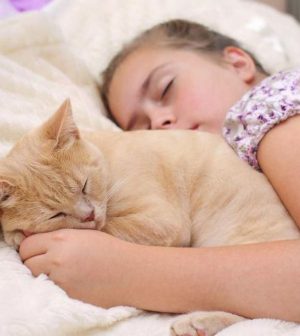- Recognizing the Signs of Hypothyroidism
- 10 Strategies to Overcome Insomnia
- Could Artificial Sweeteners Be Aging the Brain Faster?
- Techniques for Soothing Your Nervous System
- Does the Water in Your House Smell Funny? Here’s Why
- Can a Daily Dose of Apple Cider Vinegar Actually Aid Weight Loss?
- 6 Health Beverages That Can Actually Spike Your Blood Sugar
- Treatment Options for Social Anxiety Disorder
- Understanding the Connection Between Anxiety and Depression
- How Daily Prunes Can Influence Cholesterol and Inflammation
Bedtime With a Pet Won’t Harm Your Kid’s Sleep – and Might Help

Does your teen have the family cat or dog as a nighttime sleep mate? Is that even good for a child’s sleep?
In a new study, sleeping with a four-footed friend appears to be fine for pre-teens and teens. For them, sleeping with a furry family member doesn’t appear to negatively impact sleep, according to new research from Concordia University in Montreal.
“It was a pretty rigorous study on kind of a quirky little subject, but the bottom line seemed to be that it didn’t seem to make a difference and kids were happy about having the pets with them,” said Dr. Carol Rosen, a professor emertus in pediatrics at Case Western Reserve University School of Medicine in Cleveland. “Of all the things to worry about, this is probably one less thing to worry about.”
An estimated 30% to 50% of children and adults regularly share their beds with pets, according to the study. Up to 75% of households with kids have pets.
The study included 188 11- to 17-year-olds and their parents. Both kids and parents answered questions about the kids’ sleep quality.
Kids did an in-home sleep study for one night and wore a wrist device to monitor their sleep for two weeks. Each child also kept a sleep diary.
They were asked to record when they went to bed, how long they slept, how long it took to wake up and quality of their sleep, including awakenings.
Sixty-five percent said they never sleep with a pet, while 17% said they sometimes do and 18% said they often do.
Sleep quality was largely similar for all three groups. Those who shared a bed with their pet often reported the highest overall subjective sleep quality.
Researchers suggested that the reason may be because these kids view their pets as close friends and find their presence comforting.
The findings were recently published in Sleep Health, journal of the National Sleep Foundation.
Rosen said she commonly sees kids in her practice who are having trouble falling sleep, staying asleep or having a poor quality of sleep. Bedtime fears and separation anxiety can be concerns. For older children, bullying or lifestyle issues, including late nights because of homework, sports or socializing may hamper sleep, Rosen said.
“There’s a range of things that are a little bit different, why someone might have those problems if they’re toddlers, preschoolers, school age, [or] teenagers,” Rosen said.
Though it might be OK to let a child who needs comfort bring Fido or Fifi to bed, Rosen said if a “child’s really fearful or crying at night, then you probably want to talk to your pediatrician or think about seeing a sleep medicine specialist.”
Jennifer McGrath, of Concordia’s pediatric public health psychology laboratory, led the study.
A separate study — this one involving adults who co-sleep with pets was published late last year in Human-Animal Interaction, a bulletin of the American Psychological Association.
While adult study participants said their dogs didn’t disrupt their sleep, activity trackers showed that wasn’t entirely true. That suggested that even with some disturbances, the pets may be fulfilling a psychological need for feeling safe and secure, a study author said.
That the new study used technology to track sleep measures, rather than relying on all self-reported measures, makes it stronger, said Dr. Cora Breuner, a professor of pediatrics/adolescent medicine at the University of Washington in Seattle.
She estimates that between 30% and 40% of kids have a hard time falling asleep, staying asleep through the night or staying asleep long enough to be rested.
Sleep habits have become especially distorted during the pandemic. Kids — and often their parents — are going to sleep later and waking later, Breuner said.
“This whole year has been really, really hard on these kids,” Breuner said.
People can start to reverse those poor habits now by making their beds comfortable places meant for sleep and not for watching TV, using computers or reading significantly on an e-reader, she said.
It can take up to six weeks to get back on track. To make that happen, it’s important to go to bed and wake up at about the same time each day to make that happen, and to re-establish other bedtime routines, Breuner said.
“It actually is time for people to really get back to some sense of normalcy by doing this, pets not withstanding,” she said.
More information
The American Kennel Club weighs in on bed sharing with your pet.
SOURCES: Carol Rosen, MD, emeritus professor, pediatrics, Case Western Reserve University School of Medicine, Cleveland; Cora Breuner, MD, MPH, professor, pediatrics/adolescent medicine, and adjunct professor, orthopedics and sports medicine, University of Washington, Seattle, and attending physician, Seattle Children’s Hospital; Sleep Health, April 30, 2021
Source: HealthDay
Copyright © 2026 HealthDay. All rights reserved.










